How to Regain Focus After Emotional Stress
🌧️ Introduction: When the Mind Can’t Settle
You know that feeling after a big emotional storm — the argument, the heartbreak, the anxiety spiral?
You try to sit down and focus, but your brain refuses. Every thought feels heavy, scattered, and out of sync.
It’s not that you’ve lost your discipline — it’s that your nervous system is overloaded.
Emotional stress hijacks your attention because your brain’s priority shifts from focus to safety. You can’t think clearly while your body is still trying to protect you.
The good news? Focus isn’t gone — it’s just offline. And with the right strategies, you can bring it back online gently, without forcing it.
In this article, we’ll explore:
🧠 Why emotional stress disrupts concentration
💫 How to calm your nervous system for mental clarity
🌿 Nutritional and supplement support for focus recovery
🔄 Mind-body tools that restore balance and energy
💡 How to rebuild long-term cognitive resilience
Let’s start by understanding what’s really happening inside your brain when stress takes over.
Looking for supplements for This? Click here.
🧬 Part 1: Why Emotional Stress Hijacks Focus

⚡ The Brain’s Emergency Mode
When you experience strong emotions — heartbreak, rejection, conflict, fear — your amygdala (the brain’s alarm system) lights up.
It sends a message to the hypothalamus: “We’re under threat!”
That triggers the stress response, releasing cortisol and adrenaline.
These chemicals prepare you to react — not reflect.
In short:
🧠 Blood flow shifts from your prefrontal cortex (logical thinking)
❤️ Toward your limbic system (emotion and survival)
That’s why after emotional stress, you can’t concentrate. Your brain is stuck in defense mode, not creation mode.
💭 Emotional Residue and Cognitive Lag
Even after the stressful event ends, your nervous system doesn’t instantly reset.
Cortisol levels can remain elevated for hours or days, subtly impairing:
Memory recall
Decision-making
Attention span
Creativity
This post-stress “fog” is called cognitive fatigue, and it’s your brain’s way of saying, “I’m still processing what happened.”
Before you push for productivity, you need to release the emotional load first.
🌿 Part 2: Calming the Nervous System
Focus can’t happen in chaos. The first step is to shift your body out of stress mode — from sympathetic activation (fight or flight) to parasympathetic restoration (rest and digest).
Here’s how.
🌬️ 1️⃣ Use Breathwork to Reset
Breathing is the remote control of your nervous system.
Try physiological sighs, a simple, neuroscience-backed technique popularized by Dr. Andrew Huberman:
How to do it:
Inhale deeply through your nose
Take one more short inhale
Exhale slowly through your mouth
Repeat 3–5 times. Within 60 seconds, your vagus nerve signals your heart rate to slow down.
You’ll notice your shoulders drop, your thoughts soften, and your body start to feel grounded again.
🧘 2️⃣ Ground Through the Body
When emotion hijacks attention, returning to the body helps.
Try:
Feeling your feet against the floor
Stretching or shaking out tension
Doing a slow walk without your phone
Movement metabolizes stress hormones and brings you back into the present.
💧 3️⃣ Hydrate and Stabilize Blood Sugar
Stress burns through glucose and electrolytes fast. Dehydration or low blood sugar intensifies anxiety and brain fog.
Simple recovery trick:
Drink water with a pinch of sea salt or electrolytes
Eat a balanced snack (protein + complex carbs + fat)
This stabilizes energy and signals safety to your body.
🌅 4️⃣ Create “Micro-Safety Moments”
Emotional stress often leaves your nervous system hypervigilant — expecting more threat.
To counter that, create small cues of safety throughout your environment:
Soft lighting 🌙
Calm instrumental music 🎵
Warm tea or cozy blanket ☕
Weighted pillow or pet cuddles 🐾
These subtle sensory reminders retrain your body to feel grounded again — and once the body calms, the mind follows.
🧠 Part 3: How to Rebuild Cognitive Focus
Once you’ve soothed your nervous system, your brain is ready for gentle re-engagement.
But don’t go from emotional burnout straight into deep work — rebuild focus gradually, like physical rehab.
🕰️ 1️⃣ Start Small: The 10-Minute Rule
After emotional exhaustion, attention span shrinks. Instead of fighting it, use it strategically.
Set a 10-minute timer and work on one small, defined task.
When it rings, stop — no matter what.
This approach retrains your prefrontal cortex to handle structured focus without overwhelm.
🎯 2️⃣ Use “Attention Anchors”
Emotional stress scatters attention because the brain keeps replaying the event.
Counter this by creating a focus anchor — a clear, physical reminder of the present task.
Examples:
A sticky note with your top priority
A sound cue that marks work time
A short mantra like “Now I build” or “This moment matters”
Anchors help pull your attention out of emotional rumination.
🧩 3️⃣ Re-engage Working Memory
The hippocampus, which handles memory and focus, gets suppressed by cortisol.
You can gently “wake it up” with structured thinking exercises:
Journaling (writing out what happened, then shifting to reflection)
Solving a small puzzle or organizing your workspace
Planning tomorrow’s simple to-dos
This gradually reboots cognitive pathways that stress disrupted.
🎧 4️⃣ Listen to Alpha or Theta Soundwaves
Binaural beats or ambient tracks around 8–10 Hz (alpha) or 4–7 Hz (theta) frequencies support calm alertness — the ideal state between chaos and clarity.
Use them while journaling or doing light work. It’s like tuning your brain back to focus frequency.
🌿 Part 4: Nutritional and Supplement Support
Emotional stress drains key nutrients and neurotransmitters. Supporting your body nutritionally can speed recovery and focus restoration.
🧂 1️⃣ Magnesium — The Calm Mineral
Stress depletes magnesium, which is critical for relaxation and focus.
Low magnesium increases irritability and cognitive fatigue.
Best forms:
Magnesium glycinate — for relaxation and sleep
Magnesium threonate — for brain-specific focus recovery
💊 Dose: 200–400 mg daily.
🍵 2️⃣ L-Theanine — For Calm Focus
Derived from green tea, L-theanine increases alpha brain waves and GABA levels, helping you feel calm yet alert.
Perfect when you’re trying to re-enter focused work after stress.
💊 Dose: 200–400 mg, morning or afternoon.
🌿 3️⃣ Rhodiola Rosea — The Anti-Fatigue Adaptogen
Rhodiola reduces cortisol while improving stamina and cognitive endurance.
💊 Dose: 200–400 mg early in the day.
🍫 4️⃣ Omega-3 Fatty Acids — Brain Repair
Omega-3s (EPA + DHA) restore neuronal membrane flexibility — crucial for focus, mood regulation, and stress resilience.
💊 Dose: 1,000–2,000 mg combined EPA/DHA daily.
🌼 5️⃣ Saffron Extract — For Emotional Balance
Saffron (Affron®) has emerging research showing it improves mood and concentration by balancing serotonin and dopamine levels.
💊 Dose: 15–30 mg daily.
💡 Bonus: Glycine or GABA at Night
To aid emotional decompression and sleep recovery, glycine or GABA can help regulate nighttime overthinking.
💊 Glycine: 3 g before bed
💊 GABA: 100–200 mg (PharmaGABA form preferred)
Looking for supplements for This? Click here.
🧘 Part 5: Mind–Body Techniques for Emotional Focus Recovery
Emotional stress doesn’t just live in your head — it lives in your muscles, breathing, and posture.
To truly restore focus, you must reconnect the body and mind.
🌬️ 1️⃣ Breath-Body Synchronization
Try this 2-minute exercise:
Sit upright, feet flat.
Inhale through your nose for 4 seconds.
Exhale slowly for 6–8 seconds.
Place your hand over your heart.
Say internally, “I am safe now.”
This engages your baroreceptors (heart–brain communication) and shifts physiology from vigilance to calm engagement.
Want to try Breathwork? Click Here.
🧍 2️⃣ Somatic Release
Emotions are energy that the body often holds. Movement helps release them.
Try:
Shaking your hands and arms
Yawning or sighing intentionally
Gentle stretching or yoga twists
This creates space for mental focus to return.
🪞 3️⃣ Reframing the Story
After emotional turmoil, intrusive thoughts can dominate mental bandwidth.
Try cognitive reframing:
Write down the triggering situation.
Identify the story your brain is telling (“I failed,” “They don’t care,” etc.).
Then write a more balanced statement (“This was painful, but I’m learning to respond differently.”).
Reframing stops rumination loops and reopens the door to creative, focused thinking.
🧘 4️⃣ Meditation for Attention Repair
Mindfulness meditation trains you to observe thoughts without attachment — exactly what emotional recovery needs.
Start with 5 minutes of “noticing” meditation:
“I notice sadness.”
“I notice thoughts about work.”
“I return to breath.”
It’s not about silence; it’s about reclaiming the power to direct attention intentionally.
💻 Part 6: Rebuilding Focus Habits Over Time
Once your system stabilizes, it’s time to re-establish structure and direction.
📅 1️⃣ Use the “Energy–Focus Map”
Your focus is strongest when emotional charge is lowest.
Observe when during the day you feel:
Most grounded
Least triggered
Naturally alert
Schedule cognitively demanding tasks during that window.
⏰ 2️⃣ Work in Recovery Cycles
The brain can sustain deep focus for about 90 minutes before it needs rest.
Alternate between:
90 minutes of deep work
10–15 minutes of rest (walk, stretch, breathe)
This rhythmic pattern mirrors natural ultradian cycles and helps prevent emotional fatigue from building up again.
🌅 3️⃣ Morning Light and Movement
Sunlight regulates melatonin and cortisol, both essential for focus and emotional balance.
10–20 minutes of early sunlight and light exercise enhances both mood stability and daytime alertness.
🧠 4️⃣ Practice “Cognitive Re-entry”
When returning to focus after a stressful week or breakup, start with low-pressure cognitive activities:
Reading
Organizing
Light brainstorming
These gently reactivate attention networks before diving into high-stakes work.
🌈 Part 7: Building Emotional Resilience for Future Focus
To prevent emotional chaos from wrecking focus again, you need to train your nervous system’s flexibility — the ability to bounce back faster.
💪 1️⃣ Stress Inoculation
Expose yourself to mild stressors (cold showers, exercise, fasting) in controlled environments.
This teaches your body that stress can be tolerated — and released — safely.
❤️ 2️⃣ Emotional Labeling
When overwhelmed, simply naming your feeling activates your prefrontal cortex and calms your amygdala.
Say out loud:
“I’m angry.”
“I feel overwhelmed.”
This simple act reintroduces logic into emotion, allowing your attention to reorient.
🌿 3️⃣ Sleep as Recovery Medicine
Sleep is the most underrated emotional regulator.
During REM, the brain processes emotions without adrenaline, integrating difficult experiences safely.
Supplements like magnesium, glycine, or ashwagandha help restore this vital nightly therapy.
💬 4️⃣ Meaning and Reconnection
Emotional stress often fractures meaning. To recover focus, reconnect with why you care about what you’re doing.
Ask yourself:
“Who benefits from my focus?”
“What do I want to build next?”
When purpose returns, attention follows naturally.
🌙 Final Thoughts: Focus Is a Nervous System Skill

Regaining focus after emotional stress isn’t about pushing harder — it’s about soothing, replenishing, and retraining your brain.
You don’t rebuild attention by ignoring emotions. You rebuild it by integrating them, letting your nervous system know it’s safe to think again.
The sequence is simple but profound:
1️⃣ Calm the body.
2️⃣ Recenter the mind.
3️⃣ Reconnect with meaning.
Once you do, focus stops feeling like a fight — it becomes the quiet strength that follows healing. 🌿🧠
Looking for online therapy ? Click Here.
📚 References
McEwen, B. “Stress, Adaptation, and the Brain.” Annual Review of Neuroscience, 2007.
Huberman, A. “Tools for Managing Stress and Focus.” Huberman Lab Podcast, 2023.
Selye, H. The Stress of Life. McGraw-Hill, 1956.
Arnsten, A. “Stress Signaling and Cognitive Impairment.” Nature Reviews Neuroscience, 2009.
Walker, M. Why We Sleep. Scribner, 2017.
Peuhkuri, K. et al. “Diet and Sleep: Nutrients and Sleep Regulation.” Nutrients, 2012.
Panossian, A. “Adaptogens and HPA Axis Modulation.” Phytomedicine, 2021.
Kimura, K. et al. “L-Theanine and Stress Response.” Biological Psychology, 2007.
Sarris, J. “Nutritional Psychiatry and Focus Recovery.” Frontiers in Psychology, 2020.
Sapolsky, R. Why Zebras Don’t Get Ulcers. Holt Paperbacks, 2004.
Related Posts
-

How to Measure Your Emotional Growth Over Time
Emotional growth can’t be measured on a scale — but it can be tracked through awareness, regulation, and reflection. Learn how to monitor your emotional evolution using journaling, biofeedback, and science-backed metrics for real progress. 💫
-

The Connection Between Creativity and Resilience
Creativity and resilience share the same roots — adaptability, flexibility, and imagination. Learn how creative expression rewires your brain for strength, helping you transform stress into growth through neuroscience, art, and self-reflection. 🌿
-

Why Cycling Supplements May Improve Long-Term Resilience
Your body adapts to everything — even supplements. Discover why cycling your supplements helps prevent tolerance, boost energy naturally, and build lasting resilience by aligning with your body’s biological rhythms. 🌿
-

The Role of Biofeedback in Emotional Strength
Learn how biofeedback bridges mind and body — helping you monitor heart rate, breath, and brain activity to build emotional strength, resilience, and calm under pressure. See how science meets mindfulness for lasting control. 🌿
-

How to Stay Strong During Long-Term Stress
Long-term stress doesn’t just drain your energy — it rewires your biology. Discover science-backed ways to strengthen your body, balance your mind, and build lasting resilience through breathwork, nutrition, mindset shifts, and supplements that restore calm and focus. 💪
-

Resilience Training for Entrepreneurs
Entrepreneurship isn’t just about strategy — it’s about stamina. Discover how resilience training helps founders stay calm, clear-headed, and adaptable under pressure through neuroscience-backed habits, emotional regulation, and smart supplementation. 🌿
-

How Nootropics Can Boost Emotional Control
Emotions don’t have to control you. Discover how nootropics like L-theanine, ashwagandha, saffron, and omega-3s help balance brain chemistry, improve focus, and strengthen your ability to stay calm and composed under stress. 🌿
-

Stacking Adaptogens for Maximum Resilience
Adaptogens are nature’s stress shield — helping you stay calm, energized, and clear even under pressure. Learn how to stack herbs like ashwagandha, rhodiola, reishi, and schisandra for maximum resilience, balance, and long-term vitality. 🌿
-
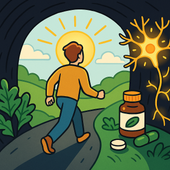
Post-Traumatic Growth and Supplements That Support It
After trauma, true healing means more than survival — it’s transformation. Learn how post-traumatic growth happens in the brain and body, and explore natural supplements like magnesium, ashwagandha, saffron, and omega-3s that support resilience, clarity, and emotional repair.
-

The Future of Sleep Supplements
The future of sleep supplements is here — where science meets nature. Discover how next-generation formulas use adaptogens, amino acids, and biotech innovations to support deep, restorative sleep without dependency. 🌙
-
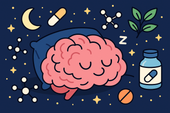
Emerging Research on Sleep and Nootropics
Can nootropics help you sleep better? Discover how compounds like L-theanine, magnesium threonate, ashwagandha, and Alpha-GPC influence neurotransmitters, circadian rhythm, and brain recovery — bridging the gap between smarter days and deeper nights. 🌙
-

New Herbal Extracts for Deep Sleep
Discover the next generation of herbal extracts for deep sleep — from saffron and magnolia to jujube and lemon balm. Learn how these plant-based compounds calm the nervous system, balance cortisol, and promote truly restorative rest. 🌙
-
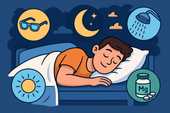
Sleep Biohacking: What Works and What Doesn’t
Biohacking your sleep can sound futuristic — from red light therapy to wearables and supplement stacks. But which hacks actually help, and which are just hype? Discover the science-backed sleep strategies that truly improve rest, recovery, and brain health. 🌙
-
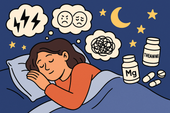
Sleep Support for People with Anxiety Disorders
💭 A restless mind can keep you up all night — thoughts spinning, heart racing, and peace feeling far away. Learn how to quiet overthinking, regulate your nervous system, and create a nightly ritual that teaches your brain to let go and rest deeply. 🌙
-
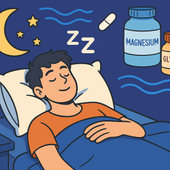
How to Fall Back Asleep After Waking Up
Waking up in the middle of the night? Learn how to fall back asleep quickly and calmly using breathing techniques, stress-reducing rituals, and natural supplements like magnesium and glycine. Restore your body’s rhythm and wake up feeling refreshed.
-
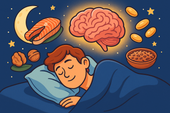
The Role of Omega-3s in Sleep Quality
-
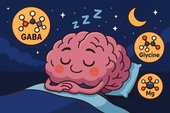
Stacking GABA and Glycine for Deeper Rest
Discover how stacking GABA and glycine can help you achieve deeper, more restorative sleep. Learn how these calming amino acids work together to relax your mind, soothe your body, and improve overall sleep quality—naturally and safely.
-

Overcoming Jet Lag with Supplements
✈️ Jet lag doesn’t have to ruin your trip! Discover how supplements like melatonin, magnesium, L-theanine, and tart cherry can help you reset your body clock faster, reduce fatigue, and recover energy naturally after long flights. 🌙
-
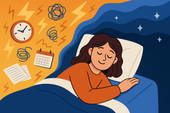
Managing Sleep During Times of Stress
Feeling wired and restless? Learn how to manage sleep during stressful times through nutrition, breathwork, and natural supplements like magnesium and L-theanine. Discover how to calm your nervous system and restore deep, peaceful rest—even when life feels overwhelming.
-

The Role of Magnesium for Night Cramps
Night cramps keeping you awake? Discover how magnesium helps relax muscles, balance electrolytes, and prevent painful spasms. Learn which forms work best, how to take them, and how to pair them with other nutrients for cramp-free, peaceful sleep.
-

Supplements That Reduce Nighttime Awakenings
🌙 Discover science-backed supplements that help you stay asleep through the night. From magnesium and L-theanine to glycine and ashwagandha, learn how these natural compounds calm your nervous system, balance cortisol, and prevent 2 a.m. wake-ups for deeper, more restorative rest.
-

Nootropics That Promote Calm and Rest
Explore the world of calming nootropics — natural brain enhancers that promote relaxation, better focus, and deeper rest. Learn how L-Theanine, magnesium, ashwagandha, and other adaptogens help balance your nervous system, reduce stress, and support restorative sleep.
-

Best Natural Supplement Stack for Sleep
Discover the best natural supplement stack for deep, restorative sleep. Learn how nutrients like magnesium, L-theanine, glycine, and calming herbs such as chamomile and ashwagandha work together to relax your body, calm your mind, and improve sleep quality—naturally and safely.
-

Combining L-Theanine and Magnesium for Sleep: A Calm Night, Naturally
Discover how combining L-Theanine and Magnesium can help you drift into deep, restorative sleep. Learn how this natural duo calms the mind, relaxes the body, and supports your nervous system—without grogginess the next morning.
-

How to Sleep Better After Intense Workouts
Struggling to fall asleep after a tough workout? Learn how to optimize your post-training recovery with nutrition, hydration, and science-backed sleep strategies. Discover how to calm your nervous system, balance hormones, and wake up fully recharged for your next session.
-

Ashwagandha and Valerian: A Bedtime Combo for Deep Rest and Emotional Reset
Discover the calming synergy of Ashwagandha and Valerian root, two natural sleep aids that help quiet the mind, ease anxiety, and promote deeper rest. Learn how this herbal duo supports the nervous system, balances stress hormones, and restores emotional peace — without next-day grogginess.
-

How to Create a Resilience-Boosting Diet
Discover how to build emotional and physical strength from the inside out with a resilience-boosting diet 🍎. Learn which foods stabilize your mood, how supplements like magnesium and omega-3s strengthen your stress response, and why pairing nutrition with breathwork and therapy creates lasting calm, focus, and vitality 🌿💪.
-

Best Teas and Herbal Blends for Calmness: Nature’s Way to Restore Inner Peace
Ashwagandha, the ancient adaptogenic herb, helps your body find balance during stress. Known as “Indian ginseng,” it supports cortisol regulation, boosts energy, and restores calm clarity. Discover how this powerful root promotes resilience, emotional balance, and steady vitality — one cup at a time. 🌸
-

Parenting and Emotional Strength: How to Raise Children Without Losing Yourself
Empathy is the bridge that connects hearts — the quiet power to understand, feel, and support another’s emotions without judgment. Learn how empathy strengthens relationships, enhances communication, and cultivates deeper compassion in everyday life. 🌿
-

How to Bounce Back from Public Failure: Reclaiming Confidence, Purpose, and Power
Visualization is more than imagination — it’s brain training for resilience. By picturing calm, success, or healing, you activate the same neural pathways as real experience. Learn how daily visualization rewires your brain for confidence, emotional balance, and recovery from stress. ✨
-

Coping with Financial Stress Through Resilience: How to Stay Grounded When Money Feels Tight
Body awareness is the foundation of emotional resilience. By tuning into your body’s signals — tension, fatigue, or calm — you learn to recognize stress before it overwhelms you. Discover how mindfulness, gentle movement, and breathwork can deepen your connection with your body and restore balance from the inside out. 🧘
-

How to Stay Positive During Chronic Illness: A Guide to Emotional Strength and Hope
Creativity is more than art — it’s a form of healing. Whether through painting, writing, music, or small acts of expression, creativity helps release emotion, calm the nervous system, and reconnect you to joy. Discover how to use creativity as a tool for emotional balance, resilience, and self-discovery. 🌿
-

Resilience Tips for Caregivers: How to Stay Strong While Caring for Others
Joy isn’t the absence of pain — it’s the quiet strength to find light even in challenging times. Cultivating joy through small daily moments restores balance, releases stress, and reminds you of life’s beauty. Learn how to reconnect with authentic happiness, rebuild emotional energy, and nurture your nervous system through gratitude, presence, and play. 🌿
-

Building Resilience After a Breakup: How to Heal, Rebuild, and Rise Stronger
Social connection is one of the strongest predictors of emotional resilience. During difficult times, genuine relationships act as anchors — calming the nervous system, reducing stress hormones, and helping you regain perspective. Learn how cultivating real human connection can strengthen your mind, heart, and overall well-being. 🌿
-

How to Stay Emotionally Strong During Job Loss
Your emotions are powered by brain chemistry — a delicate balance of neurotransmitters like serotonin, dopamine, and cortisol. When these chemicals work in harmony, you feel calm, focused, and resilient. Learn how daily habits, nutrition, and mindfulness can support your brain chemistry and boost emotional well-being naturally. 🌿
-

The Role of Hormones in Emotional Stability: How Your Chemistry Shapes Your Calm
Hormones shape more than your body — they shape your emotions, resilience, and sense of calm. From cortisol to serotonin, these chemical messengers influence how you react to stress, connect with others, and recover from challenges. Learn how to balance your hormones naturally to build lasting emotional stability and harmony within. 💫
-

Mitochondria and Emotional Energy: The Cellular Power Behind Your Mood
Breathwork is one of the most powerful tools for emotional regulation and cellular balance. Through intentional breathing, you can calm your nervous system, increase oxygen flow to the brain, and even support mitochondrial energy. Learn how conscious breathing connects body and mind — transforming stress into presence and emotional strength. 🌿
-

Inflammation and Its Impact on Mood Resilience: The Silent Link Between Body and Mind
Inflammation doesn’t just affect the body — it impacts the mind. Chronic inflammation alters brain chemistry, depletes serotonin, and makes emotional recovery harder. Learn how calming inflammation through nutrition, mindfulness, and sleep can restore balance, resilience, and a renewed sense of emotional strength. 💫
-

How Antioxidants Protect Emotional Well-being: The Hidden Link Between Oxidative Stress and Mental Health
Antioxidants do more than protect your body — they defend your mind. By neutralizing oxidative stress, antioxidants support serotonin, dopamine, and brain energy pathways that keep you calm, focused, and emotionally balanced. Discover how foods like berries, green tea, and dark chocolate nourish your brain, boost mood, and strengthen resilience from the inside out. 🌿✨
-

The HPA Axis and Emotional Health: The Hidden Bridge Between Stress and Mind
Neuroplasticity — the brain’s ability to rewire and adapt — is the foundation of emotional healing and resilience. When you face stress, trauma, or change, your neural pathways can reshape themselves to support new patterns of calm, focus, and self-awareness. Learn how daily practices like mindfulness, therapy, and breathwork strengthen neuroplasticity to transform emotional pain into personal growth. 🌸
-

Why Cortisol Control Is Key to Resilience: Mastering Stress to Build Emotional Strength
Controlling cortisol — the body’s main stress hormone — is the secret to lasting resilience. When cortisol levels stay balanced, your mind becomes clearer, emotions steadier, and energy more sustainable. Learn how breathwork, mindset shifts, adaptogens, and daily rhythms can help you calm your stress response and build true inner strength. 🌞💪
-

Dopamine’s Influence on Motivation and Recovery: Reigniting Drive and Balance
Healthy relationships are the foundation of emotional balance and resilience. Whether romantic, familial, or platonic, genuine connection releases dopamine, serotonin, and oxytocin — the brain’s “bonding trio” — helping us feel secure, motivated, and seen. Learn how trust, empathy, and communication not only strengthen your connections but also reshape your nervous system for deeper emotional well-being. 🌿🤝
-

The Role of Serotonin in Resilience: How This “Mood Molecule” Shapes Emotional Strength
Serotonin — often called the “resilience molecule” — plays a vital role in how we handle stress, regulate mood, and recover from emotional challenges. Beyond happiness, this powerful neurotransmitter helps balance the gut-brain axis, stabilize the nervous system, and support emotional flexibility. Learn how nutrition, sunlight, mindfulness, and adaptogens can naturally boost serotonin and strengthen your emotional resilience. 🌞🧠
-

How Neuroplasticity Supports Emotional Growth: Rewiring the Brain for Resilience
Neuroplasticity is the brain’s built-in power to grow, adapt, and heal — and it’s the foundation of emotional transformation. Every mindful breath, compassionate act, or reframed thought strengthens new neural pathways that support resilience and self-awareness. Learn how your brain rewires through daily habits, helping you turn emotional challenges into opportunities for growth and calm. 🌿
-

Tai Chi and Adaptogens for Mind-Body Balance: The Art of Harmonizing Energy and Resilience
Alchemy isn’t just an ancient science — it’s a timeless symbol of transformation and inner balance. By blending the physical and spiritual, alchemy teaches us that change begins from within. Just as metals are refined into gold, we too can transmute emotional pain, stress, and chaos into clarity and strength through mindful practice and self-awareness. 🌙✨
-

Cold Therapy and Emotional Control: Training the Mind Through the Body
Cold therapy isn’t just for athletes — it’s a tool for emotional mastery. By exposing your body to controlled cold, you train your nervous system to stay calm under stress, improving focus, mood, and resilience. This article explores the science of cold exposure, its impact on hormones and the vagus nerve, and how ice baths and cold showers can help you build emotional control, one breath at a time. 🧊🧘♂️
-

How Music Influences Emotional Recovery: The Healing Soundtrack of the Mind
Neuroplasticity — the brain’s ability to rewire and heal itself — is at the heart of emotional recovery. Through mindful habits, music, therapy, and consistent mental stimulation, your brain can form new connections that support resilience and well-being. Discover how neuroplasticity turns pain into growth, helping you rebuild balance, focus, and emotional strength. 🌿
-

Nature Therapy for Building Resilience: Reconnecting With the Healing Power of the Earth
Nature therapy helps rebuild emotional resilience by reconnecting you with the healing rhythms of the Earth. From forest walks to sunlight exposure, nature restores balance to your nervous system, lowers stress hormones, and teaches emotional adaptability. Learn how spending time outdoors can enhance mental clarity, calm anxiety, and awaken your natural capacity to heal. 🌞
-

Breathwork Techniques That Pair with Supplements: The Ultimate Synergy for Stress Relief and Mental Clarity
Breathwork and supplements create a powerful mind-body synergy for stress relief, focus, and energy. By combining intentional breathing with adaptogens, nootropics, and calming nutrients, you can naturally regulate cortisol, sharpen mental clarity, and boost emotional balance. This guide explores the best breathwork techniques and supplement pairings to help you feel centered, calm, and energized from the inside out. 🌿

















































